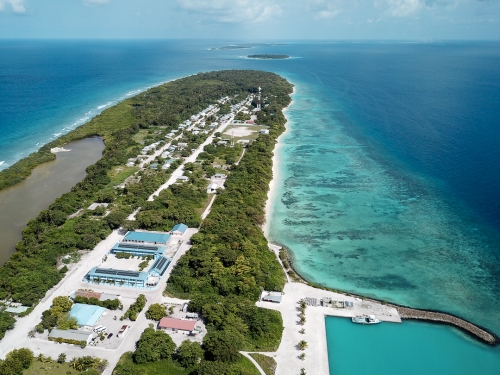
The Indian Ocean island nation of the Maldives has begun tendering for 40MW / 40MWh of battery energy storage systems across several regions.
The Republic of Maldives’ government said some of the proceeds of financing it has received from the World Bank to help accelerate renewable and sustainable energy integration will be used to pay for contracts.
Enjoy 12 months of exclusive analysis
- Regular insight and analysis of the industry’s biggest developments
- In-depth interviews with the industry’s leading figures
- Annual digital subscription to the PV Tech Power journal
- Discounts on Solar Media’s portfolio of events, in-person and virtual
Or continue reading this article for free
The Ministry of Finance issued an invitation to prequalify for the supply, installation, commissioning, operation and transfer of battery energy storage systems (BESS) on selected islands on 10 June. Interested parties have until 26 August to register with the Ministry and pay a US$100 registration fee. They must then submit their applications to prequalify by 2 September.
The tender will be conducted in two lots, the first for 24MW / 24MWh of BESS at seven sites and Lot Two for 16MW / 16MWh at sites in five areas. Meanwhile the Maldivian Ministry of Environment, Climate Change and Technology published a prequalification document which sets out the process and instructions to applicants as well as setting out project requirements.
As the Maldives islands are dispersed and the population of around 540,000 people live around the 1,192 different islands, each region needs its own power generation and distribution system. Relying on imported diesel for electricity, the country is seeking to overcome economic and environmental burdens that this brings, largely by increasing the use of solar PV.
Along with 187 islands inhabited by the Maldivian population, 123 islands are self-contained tourist resorts and 128 are primarily used for industry and commerce and the government is targeting 70% of renewable energy in the national energy mix by 2030 across all of them; a sharp increase from around just 4% today.
The new drive for renewables through the World Bank’s Accelerating Renewable Energy Integration and Sustainable Energy (ARISE) project follows the previous Accelerating Sustainable Private Investment in Renewable Energy (ASPIRE) programme from the multi-lateral development bank, which has allowed the Maldives government to tender for several dozen megawatts of solar PV.
ARISE is being paid for using loan and grant funding, with US$23 million of concessional loan money from the World Bank Clean Technology Fund to finance the BESS projects being tendered for. The battery systems will support grids where more than 30MW of solar PV will be installed through the ASPIRE programme.
Applicants must be able to deliver turnkey BESS and energy management systems (EMS) to support solar PV-plus-diesel hybrid power systems. The tender is battery chemistry agnostic to lithium-ion batteries with NMC, NCA, LT or LFP chemistry.
The tender follows shortly after Energy-Storage.news reported that Germany-headquartered microgrid developer DHYBRID has installed microgrid systems including solar and battery storage on 26 of the Maldives’ islands. The systems, which have a total capacity of 2.65MW of solar PV and 3.2MWh of battery storage, are notable for being controlled and monitored using one single SCADA system. They were installed through a programme of the Asian Development Bank, called Preparing Outer Islands for Sustainable Energy Development (POISED).
Documents about the tender are available on the Ministry of Finance website here.
